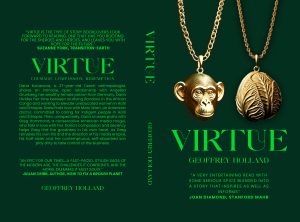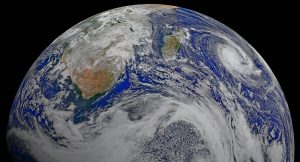Virtue & Planetary Well-being: An Interview with Geoffrey Holland
Dec 6th, 2024 | By admin | Category: Environment/Sustainability, FeaturedBy Geoffrey Holland and Suzanne York.
Geoffrey Holland is a journalist focused on gender rights and the human relationship with nature. He is also the recent author of Virtue, a contemporary novel that entertains the reader with a story that showcases a feminist anthropologist, who finds love and inspires others with her commitment to nature, people, and planet.
Here is Transition Earth’s interview with Geoff, where he answers questions about Virtue and the bigger picture for life on Earth. Geoff has been a past contributor to the Transition Earth blog and is well-versed in many of the critical issues facing the world today:
Can you talk about the planetary-scale dysfunction unleashed by humans; dysfunction that is destroying the living biosphere we all depend on?
Humans have been a distinct species for about 200,000 years. Taking what we need from our planet’s living bounty is instinctive. It’s how we humans have survived and prospered. For the longest time, our exploitation of nature was not consequential because there weren’t enough of us to make a difference. All that has changed. In just the past hundred years, the human population on Earth has exploded. In just a century, we went from 2 billion in number to more than 8 billion, with about 75 million more humans being added every passing year. Our Earth hasn’t gotten any larger. Humans are now taking pretty much every resource our Earth has to offer for themselves. As a consequence, wild animal populations on Earth have collapsed by 73% in just the past 50 years. Human overreach and dysfunction has caused a whole range of unprecedented existential challenges that are exhausting the living systems that we all depend on for survival. Our politics have failed to recognize and address these challenges. There is no denying that cultural collapse on a planetary scale is a very real possibility in coming decades.
Is it already too late for redemption?
Humans are a long way down the road to ruin. The evidence for that reality is overwhelming. There are solutions to massive issues like climate change, human overpopulation, and our squandering of the living bounty of our planet. Redemption is possible, but it will not happen until humans, as our planet’s most consequential species, can get past the sense of entitlement they share where the exploitation of nature is concerned. Human entitlement must be replaced by a massive cultural commitment to caring for the natural world we all depend on.
Do our planetary-scale problems require planetary-scale solutions?
No question. Existential threats like climate change, the flooding of our oceans and waterways with every kind of human industrial waste, and the pressures of feeding so many billions of humans are now hugely impacting our entire planet. These monumental issues can only be addressed adequately with public policy solutions applied on a planetary scale. The tribalism and self-interest that currently define the politics of life on Earth are a certain dead end for humanity.
What makes you hopeful?
Early in the 21st century, when global-scale human overreach threatens life on Earth as never before, we do have something potentially transformative going for us. Computers, cell phones, and the social media connect all of humanity together cross-culturally, as never before, in real time. We now have the means to share common purpose and commitment among all of our Earth’s people. To do this effectively, we must prevail over the cultural old guard, which is determined to use this same, social media messaging capability to resist change and protect the tribalism and self-interest in which they are heavily invested.
What special place do women have in shaping a worthy human future?
Cooperation and a shared commitment to survival has defined human behavior through the majority of our time on Earth. That all changed about 10,000 years ago, when humans began to shift from being nomadic scavengers to living in permanent settlements and feeding themselves by growing edible crops and raising livestock animals to eat. From that, a warrior class emerged. Men became dominant. Woman were marginalized and denied a voice. History from that point has been shaped by tribalism and turf wars. That all began to change again in the developed nations in the 19th century as industrialism took hold and people began migrating to life in big cities. For women, city life often translated to living in slums, caring for children, and working in sweat shops. In the U.S, in 1920, women finally got the constitutional right to vote. That was the beginning of the end for male cultural dominance. Now, early in the 21st century, women’s voices are echoing as never before. On every cultural level, women are now finding their place as leaders and agents of change. By nature, women are wired to be nurturers. They can and will be primary players in moving humanity toward a sustainable future, living in harmony with nature.
You are a voice for a gender-equal ‘Partnership Way’ of being human. Can you talk about that?
I credit the iconic cultural historian Riane Eisler for what I know about the acute gender dissonance that has defined humanity since the beginnings of living in permanent settlements. The primary lesson Riane Eisler offers humanity is that the most worthy way forward will be built on a gender equal, ‘Partnership Way’ of being human. That’s all of us cooperating together, sharing responsibility for remaking humanity in the best possible way. What it means is that all humans, regardless of gender identity, will all share equal rights and the same obligation to be responsible caretakers of the living biosphere we all depend on. I am committed to Riane Eisler’s vision. ‘Partnership’ is how we put humanity on a worthy redemptive course.
You have also had a lot to say about an emerging idea called the Earth System Treaty. Why do you support this treaty?
Yes, it seems clear enough that our world of people is desperately in need of an idea we can share in common; a beacon we can all rally behind. There have been some very worthy ideas that have aspired to be a global, cross-cultural, rallying point. Thus far, none of those ideas have gained traction on the scale needed. The Earth System Treaty’s primary voice, best-selling science writer Julian Cribb, calls it a message the entire world of people can stand behind. The Earth System Treaty is built around a set of principles written to be acceptable to any thoughtful human, no matter gender identity, ethnicity, or nationality. This treaty is intended to be codified by the United Nations, in concert with all the world’s nations, and all the world’s people. It was designed from scratch to be presented through the social media. Take a moment to imagine a world of people standing behind the Earth System Treaty. Imagine the political power, the capacity for transformative change, that could emerge from a cross-cultural commitment to such a treaty. I believe the Earth System Treaty is an idea made for the moment. I’m doing all I can to draw attention to the Earth System Treaty.
You’ve just had your adult contemporary novel Virtue published. What is the message that emerges from its story?
My intent as a novelist was first to shape a story that would be a very entertaining and engaging read. I found the motivation for Virtue from real people, whose example inspired me. They include the physician and humanitarian, Paul Farmer, co-founder of Partners in Health. The primary feminist voice in Virtue was inspired by the iconic social historian, Riane Eisler, and also by the revered naturalist, Jane Goodall. The story line for Virtue includes threads that are reflective of these three truly distinguished leaders. Virtue is designed to entertain the reader with a story that offers a vision of a better kind of world; a world built on a human commitment to assuring a livable future for generations yet to come.
How does humanity redeem life on Earth by embracing common purpose?
Finding common purpose across the entire planet really is a massive, unprecedented challenge. Getting past our worst human instincts requires that we all find a way to trust each other and cooperate based on a big vision for the human future. The Earth System Treaty is a big idea that can serve the best interests of people all over the world. The Earth System Treaty is a beacon that can inspire the kind of planetary scale redemption that our world so desperately needs.
What does the best kind of human future look like?
The best kind of future begins with a commitment to a world built on a cross-culture, gender-equal partnership. It will emerge from shared common purpose. It will be inspired by the Earth System Treaty and will result in a planetary-scale Constitution and Bill of Rights that will apply to all of humanity. In the best kind of future, humans will be governed as an Earth-sized democracy powered by clean, renewable energy. It will include a commitment to voluntarily reduce our population numbers to a sustainable level, and a commitment to revitalize our human relationship with nature. In the best kind of future, humans turn away from entitlement. They will restore healthy biodiversity to our planet. They will usher in a transformative era worthy of the most intelligent and consequential species on Earth.



![[photo: Biodiversity Wikimedia Commons]](http://populationgrowth.org/wp-content/uploads/2024/12/Biodiversity-Wikimedia-Commons-262x300.png)
